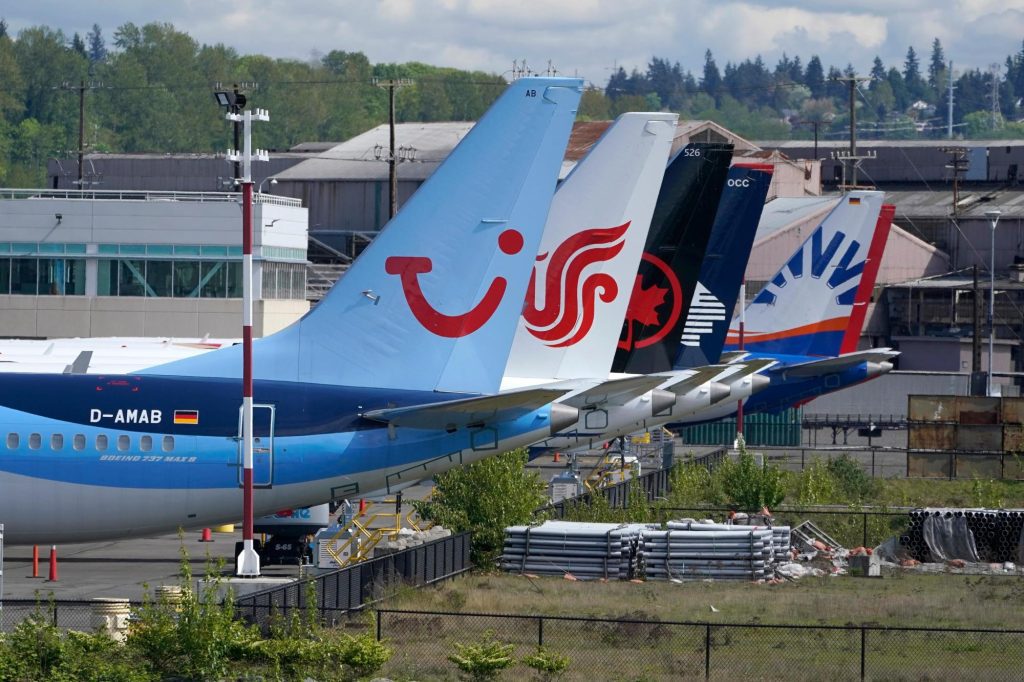By DAVID KOENIG (AP Airlines Writer)
Boeing announced on Wednesday that it suffered a $355 million loss due to declining revenue in the first quarter, indicating the ongoing crisis affecting the aircraft maker as it confronts growing scrutiny regarding the safety of its planes and allegations of poor workmanship from an increasing number of whistleblowers.
CEO David Calhoun stated that the company is currently facing a challenging period, with the primary focus being on resolving its manufacturing issues rather than the financial outcomes.
Company executives have been compelled to shift the conversation from finances to safety following an incident where a Boeing 737 Max experienced a door plug malfunction during an Alaska Airlines flight in January, resulting in a significant hole in the aircraft. The incident halted the apparent progress that Boeing was making in recovering from
two fatal crashes involving Max jets in 2018 and 2019. These crashes in Indonesia and Ethiopia are once again receiving attention. The relatives of some of the 346 individuals who lost their lives in the crashes were scheduled to meet with officials from the U.S. Justice Department later on Wednesday. Family members have been unsuccessful in their attempts to overturn a 2021 settlement between the department and Boeing, enabling the company to avoid criminal prosecution.
“Despite announcing our first-quarter financial results today, our primary focus remains on the extensive measures we are implementing following the Alaska Airlines Flight 1282 incident,” Calhoun informed employees in a memo on Wednesday.
He outlined a series of measures being taken by the company and reported “significant progress” in enhancing manufacturing quality, much of which has been achieved by reducing production speed, resulting in fewer planes for its airline customers. Calhoun informed CNBC that closer inspections have led to an 80% decrease in defects in the fuselages sourced from key supplier
Calhoun, who will
at the end of the year, reiterated his full confidence in the company's ability to rebound. step down Boeing reported a first-quarter loss, excluding special items, of $1.13 per share, which was better than the anticipated loss of $1.63 per share as per a FactSet survey.
Revenue decreased by 7.5% to $16.57 billion.
The company's shares rose by 3% shortly after the start of morning trading.
Boeing's stock has plummeted by approximately one-third since the Alaska Airlines door-plug incident.
The Federal Aviation Administration has intensified its oversight and has given Boeing until late May to develop a plan to address issues in the manufacturing of 737 Max jets. Airline customers are dissatisfied over the delayed delivery of the new planes they had ordered due to disruptions in the delivery process. Investigators examining the Alaska flight revealed that the bolts responsible for securing the door plug were
missing after maintenance work at a Boeing facility. The FBI informed passengers that they could be victims of a crime Several former and one current manager have reported various issues in the manufacturing of Boeing 737 and 787 jetliners. The most recent, a quality engineer, informed Congress last week that Boeing is taking shortcuts in manufacturing that could potentially result in 787 Dreamliners breaking apart..
Boeing delayed their response fiercely against his assertions. However, Boeing has a couple advantages.
Together with Airbus, Boeing makes up one of the two main companies dominating the production of large passenger planes. Both companies have long lists of orders from airlines wanting new, more fuel-efficient planes. Additionally, Boeing is a major defense contractor for the Pentagon and governments worldwide.
Richard Aboulafia, an experienced industry analyst and consultant at AeroDynamic Advisory, mentioned that despite all the obstacles Boeing still has a strong combination of sought-after products, technology and personnel.
“Even if they are No. 2 and have major issues, they are still in a very strong market and an industry that has very high barriers to entry,” he said.
And despite huge losses — about $24 billion in the last five years — the company is not at risk of failing, Aboulafia said.
“This isn’t General Motors in 2008 or Lockheed in 1971,” Aboulafia said, referring to two iconic corporations that needed massive government bailouts or loan guarantees to survive.
All of those factors help explain why 20 analysts in a FactSet survey rate Boeing shares as “Buy” or “Overweight” and only two have “Sell” ratings. (Five have “Hold” ratings.)
By DAVID KOENIG (AP Airlines Writer) Boeing said Wednesday that it lost $355 million on falling revenue in the first quarter, another sign of the crisis gripping the aircraft manufacturer as it faces increasing scrutiny over the safety of its planes and accusations of shoddy work from a growing number of whistleblowers. CEO David Calhoun […]









